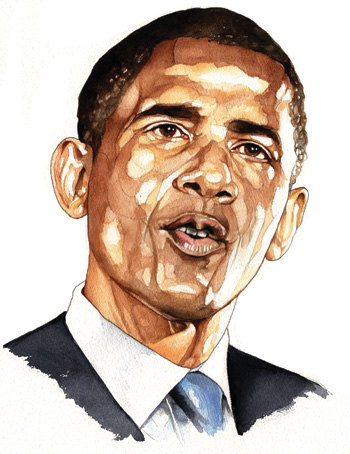
African Americans scored better on tests during key moments of Obama’s presidential run.
One of the most profound questions raised by the presidential run of Barack Obama is whether it has had an impact on African Americans overall. The answer—according to new research from Vanderbilt, San Diego State and Northwestern universities—is an unequivocal yes in the key area of test-taking achievement. Documenting what the researchers call the “Obama Effect,” the study identifies that the performance gap between black and white Americans in a series of online tests was dramatically reduced during key moments of the 2008 presidential campaign when Obama’s accomplishments garnered the most national attention.
The tests in the study were administered to a total of 472 participants using questions drawn from Graduate Record Exams to assess reading comprehension, analogies and sentence completion. The tests took place at four distinct points over three months during the campaign: two when Obama’s success was less prominent (e.g., prior to his acceptance of the nomination and the midpoint between the convention and Election Day) and two when it garnered the most attention (e.g., immediately after his nomination speech in August and his win of the presidency in November).
The nationwide testing sample of 84 black Americans and 388 white Americans—a proportion equivalent to representation in the overall population—was matched for age and education level. It revealed that white participants scored higher than their black peers at the two points in the campaign when Obama’s achievements were least visible. However, during the height of the Obama media frenzy, the performance gap between black and white Americans—even if blacks felt their performance on the test might reinforce negative stereotypes—was effectively eliminated. In addition researchers pinpointed that black Americans who did not watch Obama’s nomination acceptance speech continued to lag behind their white peers, while those who did view the speech successfully closed the gap.
“Our results document compelling evidence of the power that real-world, in-group role models like Obama can have on members of their racial or ethnic community,” says Ray Friedman, Brownlee O. Currey Professor of Management at the Owen School and co-author of the study.
As part of the study, Friedman—along with David M. Marx of San Diego State University and Sei Jin Ko of Northwestern University—also examined whether Obama’s success reduced negative racial stereotypes. Participants were asked whether they were concerned that poor performance on the exam would be attributed to their race. The results indicate that blacks were concerned that they faced negative stereotypes about academic achievement whether Obama was prominent or not, but when Obama was prominent they were able to overcome that concern and perform better on the test.
Friedman points out that other research has shown that such historical stereotypes are an underlying reason for lagging test-taking performance by black Americans. “Obama as a role model did not have an immediate impact on black Americans’ concerns about such stereotypes,” Friedman says. “However, our findings give us reason to believe that the influence of extraordinarily successful role models like Obama will help to drive improved performance and, over the longer term, to dispel negative stereotypes about black Americans, bringing us closer to a ‘post-racial’ world.”
